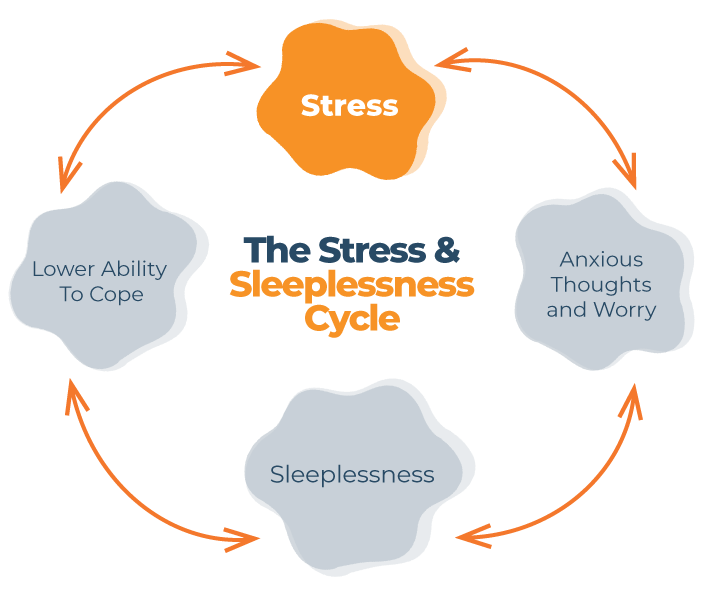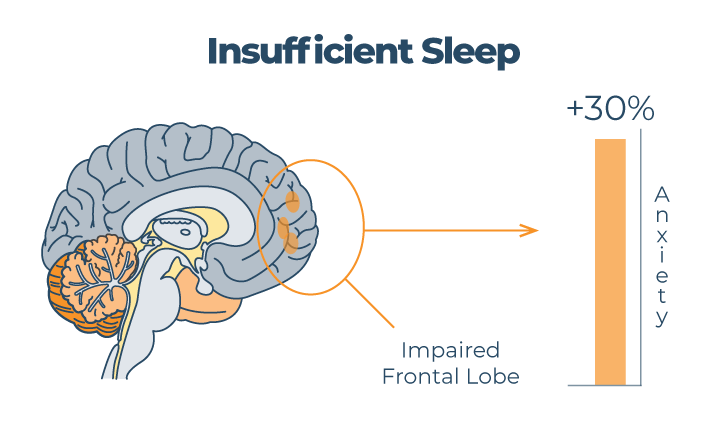Stress can come from all sorts of sources: work, school, traffic, social media, relationships, and more. Despite knowing that stress isn’t healthy, it’s not always easy to let go of, though. Often, people experiencing stress will find themselves struggling to fall asleep at night, with anxious thoughts running through their mind.
Stress can contribute to sleep loss, but did you know that sleep loss can make stress worse? Keep reading to find out what science says about stress, its dangers, and how managing sleep properly could improve your ability to cope.
What Exactly Is Stress?
Before we can dive into the purpose that stress serves, we first need to understand what it is. Waiting for medical test results can be stressful, planning a wedding can be stressful, and living amid a world disaster can be stressful. If I were to ask you what stress feels like, your response would likely be different from my or anyone else’s.
According to the American Institute of Stress[1], the term was coined by scientist Hans Selye in 1936 and was defined as “the non-specific response of the body to any demand for change.” Selye began conducting animal experiments and noticed that animals subjected to stressful situations developed short-term symptoms like stomach ulcers, enlarged adrenals (which regulate the stress hormone cortisol), and shrinkage of lymphoid tissue (impacting the immune system). Even more startling, he discovered that the stressed animals went on to develop various diseases, including arthritis, heart attacks, stroke, and kidney disease.
The term “stressor” was also introduced to help people understand the difference between a stimulus and the response. Is all stress bad, though? Dictionaries began defining[2] it as “a state of mental or emotional strain or tension resulting from adverse or very demanding circumstances.” The original definition said it was a nonspecific response, not necessarily a negative one.
Some stress can be positive and even helpful if it motivates people into action, which Selye called “eustress.” As you can see in the graph below, eustress is helpful by increasing productivity up to a certain point (the tipping point) until it becomes too much and things rapidly decline. The problem is, how do you know when you’ve reached that tipping point, and what can you do to stop it?

So now we understand a little more about its purpose and why it’s necessary for our survival. Without eustress or distress, we wouldn’t be motivated into action. If a lion is chasing you, you want to experience that feeling of distress so you know to run. Likewise, if you’re preparing for an exam and don’t feel a little eustress, you won’t take the necessary time to study and ready yourself with ample rest.
The Cycle of Stress and Sleeplessness

Being chronically stressed can lead to sleeplessness, but lack of sleep can also make you more susceptible to stress. It’s like a chicken and egg scenario, and figuring out which came first can be complex.
When certain hormones like adrenaline and cortisol are elevated in the body, your brain has a difficult time shutting down. It thinks that you’re in danger, and the last thing your body wants to do when a threat is imminent is sleep. Chronic physical symptoms like muscle aches, headaches, and acid reflux can also cause pain and discomfort and make it challenging to fall asleep.
For many people, sleeplessness itself can be stressful. Staring at the clock as it counts down the remaining hours until you have to get up can feel frustrating. The longer you lay there tossing and turning, the more anxious you become and the more difficult it is to fall asleep.
Maybe you do finally fall asleep for a couple of hours, but you’re still chronically sleep-deprived when your alarm goes off the next morning. You compensate for low energy and brain fog with sugar and caffeine, sending your blood sugar and insulin levels on a roller coaster ride that leaves you feeling nauseous, dizzy, and forgetful. The increased blood sugar and caffeine in your system make it impossible to fall or stay asleep that night, and the whole cycle of sleeplessness repeats.
The 2017 Stress in America[3] survey by the American Psychological Association found that 46 percent of adults reported that lying awake at night was one of the outcomes of increased stress.
We talked earlier about how stress activates the HPA axis, increasing cortisol and causing increased alertness. According to research, the opposite is also true: “On the other hand, sleep and particularly deep sleep, has an inhibitory effect on the stress system, including its two major components: the HPA axis and the sympathetic system.”
Getting good rest, however, can play a significant role in managing stress. According to research[4], sleep, especially deep sleep, can restrain the body’s stress system. Research[5] from the University of California, Berkeley led by the popular sleep scientist and best-selling author Matthew Walker also discovered similar findings. The study discovered the strongest information linking anxiety and sleep to date. The research found that deep sleep can significantly lower stress and anxiety, while even one sleepless night can trigger up to a 30-percent increase in anxiety levels.

What does this mean for you? Sleep, and especially deep sleep, can stop the activation of the fight or flight response in the body. This is great news if you can manage to sleep, but what happens when a few sleepless nights turn into weeks, months, or even years?
When Does Sleeplessness Become Insomnia?
Lots of things can cause the occasional poor night’s rest—drinking coffee too late in the day, studying for an exam, binge-watching Netflix, sleep training your baby, or stressing about a worldwide pandemic. Sleeplessness can involve difficulty falling asleep, staying asleep, or waking up too early in the morning. For most people, this leads to getting less than the optimal seven to eight hours of sleep and all of the ensuing consequences of too little rest like daytime fatigue, irritability, and anxious thoughts.
If your sleeplessness is a result of a stressful situation at work or perhaps a bad breakup, sleep typically returns to normal as soon as the circumstances resolve. On the other hand, if the source of anxiety continues, the sleepless nights continue, and before you know it, you’re chronically sleep-deprived.
Research studies[6] have found that between 33 and 50 percent of the adult population experience symptoms of insomnia. Short-term insomnia is most commonly associated with stress and can last anywhere from days to weeks. Chronic, or long-term, insomnia has many different causes and typically lasts months to years.
Mayo Clinic[7] lists the symptoms of insomnia as:
- Difficulty falling asleep at night
- Waking up during the night
- Waking up too early
- Not feeling well-rested after a night’s sleep
- Daytime tiredness or sleepiness
- Irritability, depression or anxiety
- Difficulty paying attention, focusing on tasks or remembering
- Increased errors or accidents
- Ongoing worries about sleep
According to the American Academy of Sleep Medicine[8], the effects of insomnia may include:
- Fatigue
- Moodness
- Irritability or anger
- Daytime sleepiness
- Anxiety about sleep
- Lack of concentration
- Poor Memory
- Poor quality performance at school or work
- Lack of motivation or energy
- Headaches or tension
- Upset stomach
- Mistakes/accidents at work or while driving
Only a doctor can diagnose insomnia, but if you’re struggling with sleep and recognize any of the symptoms or effects of insomnia in yourself, it may be time to make an appointment with your healthcare professional to rule out other causes. In some cases, your doctor may prescribe medication, but when lack of sleep is related to anxiety and fear, it’s important to address the root cause.
How to Reduce Stress for Better Sleep
Journal
Journaling can help you to track the fears and concerns that are underlying your stress. Getting your thoughts out and onto paper gives you a sense of relief that you’ve acknowledged your worries. It also gives you the opportunity to track your progress and see patterns of success that may help you cope.
You can take our downloadable dream journal sheets if you need prompts to help you start.
Yoga
Strenuous exercise in the evening hours can stimulate the body and brain, but gentle stretching and yoga can be relaxing. Yoga helps to center the mind and releases endorphins that can improve mood and calm anxious thoughts. Check out these gentle poses to help you sleep.
Prayer/Meditation
Both prayer and meditation offer an opportunity to still the mind and bring your focus to one thing. This involves tuning out the many worries and anxieties of the day and finding inner peace and stillness. Done daily, these practices can train the mind to relax and let go of stress.
Take a Detox Bath
A detox bath is a hot bath with Epsom salts, baking soda, and essential oils to help draw toxins out of the body. This relaxing bath can also be beneficial for the mind, detoxing the negative thoughts and worries of the day. Incorporating relaxing oils like lavender and chamomile can also help to get your body ready for sleep.
Try Aromatherapy
Essential oils are growing in popularity and for a good reason. Plenty of research has explored the many benefits of aromatherapy for things like depression, anxiety, and sleep. Check out some of the best options for promoting relaxation.
Listen to Music
Music has the ability to evoke many different emotions. It can raise your spirits with uplifting beats or calm your mind with soothing melodies. Find out which genres are the best to incorporate into your pre-bed routine.
Turn off Electronics
Many people spend their evening hours surfing the net on their phones or watching TV in bed. Unfortunately, artificial light from electronic devices can stop the flow of the sleep-inducing hormone melatonin. Explore some tips on how to “unplug” your nighttime routine, including turning off all electronics three hours before bed.
Deep Breathing
The more anxious you become, the faster your breathing becomes, and before you know it, your brain lacks oxygen, accelerating the stress response and creating a vicious cycle. One of the fastest and easiest ways to interrupt that cycle is to calm your breath. Taking deep breaths in and out over and over can put your body and mind back into a peaceful state.
Progressive Muscle Relaxation
This technique involves progressively tensing and then relaxing muscles, starting at your toes and working all the way to your head. Not only does this have a calming effect on the body but it also centers your thoughts and can have a calming effect on the mind.
Use a Weighted Blanket
Weighted blankets use the power of deep-pressure touch by applying pressure to the body’s touch receptors. Similar to the feeling of a comforting hug, this increases serotonin production and can help with relieving stress and inducing sleep.
Download: To easily access these tips any time you need them, you can download this pamphlet.
How Stress Affects the Body
You’ve probably heard the term “fight or flight” before, typically in reference to a caveman being chased by a lion or a wooly mammoth. While we don’t typically find ourselves literally running for our lives in the present day and age, we often feel like we’re fighting for our lives when we’re faced with stressful situations. A scary medical diagnosis, an overdrafted bank account, or a devastating breakup can all elicit the same classic fight or flight reaction in the body that our Paleolithic ancestors experienced when faced with danger.
The fight or flight response causes chemical changes in the body to prepare you to take action. It starts when the emotional processing center of your brain, the amygdala, sends a signal to the main command center in your brain, the hypothalamus. The hypothalamus is interconnected with your entire body through the autonomic nervous system, which controls all of the automatic functions in your body — breathing, heart rate, etc.
All of these functions are regulated through two different systems: the sympathetic nervous system and the parasympathetic nervous system. When the hypothalamus detects a stressor from the amygdala, it sends a message to the adrenal glands and activates the sympathetic nervous system with a fight-or-flight response. The parasympathetic nervous system has the opposite effect, calming things down and moving you into “rest and digest” mode.

When the sympathetic nervous system is activated, the adrenals start pumping out adrenaline to make your heart beat faster and stronger. This helps to direct blood flow to the muscles and organs so you can focus on thinking and moving quickly. Your breathing also accelerates, and sugar is released into your bloodstream to give you more energy.
The hypothalamus also activates another system in the body known as the HPA axis (hypothalamus, pituitary, and adrenals). This axis responds by pumping out stress hormones, including cortisol, to keep you awake and alert.
Physical Signs of Stress
You wake up on the living room sofa in a daze, confused about how you got there and why your kids are asking you what’s for breakfast. As you scramble to check the clock, you suddenly realize that your kids are about to miss the school bus and you’re going to be late for a very important meeting. Your heart starts racing, and beads of sweat dampen your forehead.
With no time for breakfast, you down some coffee and join the sea of cars moving along at a snail’s pace. By the time you finally get to work, you’ve missed the meeting entirely, and your boss demands an explanation. Your stomach is in knots and a million possible excuses flood your brain.
The day drags on, but at 5 o’clock, you finally begin your journey back home in more standstill traffic. When you walk through the door, you’re bombarded with questions about what’s for dinner, and you feel your breathing accelerate. Hours later when you crawl into bed, you find yourself wide awake despite obvious exhaustion.
Sound familiar?

Racing heart, sweaty palms, upset stomach, difficulty sleeping—these are just some of the physical responses you may be feeling when you have a fight-or-flight reaction to a stressful situation. This response was designed to be temporary, giving your body the tools it needs to quickly remove yourself from a dangerous situation. As soon as you’re safe, the body initiates the parasympathetic nervous system to go back to a resting state.
What happens when stress is ongoing, though? The body was never meant to be in a fight or flight state all of the time. How much of your day do you spend worried or anxious? Does your day resemble the scenario above?
Chronic stress takes a toll on the body. Check out this comparison between the physical signs of short-term and long-term stress.
| Body System | Short Term Symptoms | Long Term Symptoms |
|---|---|---|
| Cardiovascular | Heart rate increasesBlood vessels dilateMuscles inflateBlood pressure rises | Heart rate elevated all the timeBlood pressure elevated all the timeRisk for cardiovascular events increases (hypertension, heart attack, stroke)Increased cholesterol |
| Gastrointestinal | Nausea/VomitingStomach painHeartburnDiarrhea or constipation | UlcersAcid refluxIBSWeight loss or gain |
| Respiratory | Breathing fasterHyperventilationPanic attacks | Chronic panic attacksWorsening of conditions like asthma, emphysema, and other breathing disordersLower oxygenation |
| Musculoskeletal | Muscle tension | Muscle and joint painChronic painMigraines and headachesBackaches |
| Endocrine | Increased adrenaline and cortisolTemporary burst of energyIncreased blood sugar | Chronically elevated hormonesLow energyLow sex driveInfertilityErectile dysfunctionType II DiabetesThyroid problemsIncreased abdominal fatIrregular/painful periodsIncreased symptoms of menopause |
| Immune system | Temporary immunity boostLower infectionsIncreased healing | Lowered immune systemFrequent colds and flusDelayed healing timeInability to fight off serious infections |
| Brain | Increased alertnessTemporary mental clarity | SleeplessnessInsomniaIrritabilityForgetfulnessFoggy thinkingDepression/AnxietyMental Health Issues |
| Other | May increase the spread of cancerDark, puffy eyesTeeth grindingItching and hivesHair lossAcneDry skin |
That’s a long list of symptoms. Can you recognize any of these in yourself? How about sleeplessness? There’s no doubt that stressful situations can leave you feeling exhausted, but many people complain of being “wired tired,” meaning they can’t seem to sleep despite fatigue. Let’s explore the intricate relationship between stress and sleep a little further.
Questions For Your Doctor
What is hyperarousal insomnia?
Hyperarousal is a constant state of physical and mental tension day and night. It often results from a traumatic or stressful event and puts the brain in a hyper-alert state because it senses a threat.
believe that hyperarousal results from an “imbalance between arousing and sleep-inducing brain activity.” If you feel like your body and mind are operating on overdrive 24/7 and you’re struggling to fall asleep at night, it could be hyperarousal insomnia. Talk to your doctor about your symptoms and concerns if you think that arousal and stress may be negatively influencing sleep.
Can stress be keeping me awake?
When the brain goes into a fight-or-flight state, it may be easy to get through the day because the body and mind are on overdrive. Unfortunately, that hypervigilant state doesn’t stop when you lay your head on the pillow at night. Your stressor may be related to work or a relationship—not something life-threatening like being chased by a lion—but your brain can’t tell the difference.
A stressed mind goes into survival mode, and sleep is the last thing your brain thinks it needs when your life is at stake. If you find yourself laying in bed with racing thoughts that just won’t stop, talk to your doctor about stress-induced insomnia.
Is my insomnia chronic?
Many people suffer from the occasional bout of sleeplessness, but when lack of sleep persists, it may become a chronic problem. Short-term (or acute) insomnia generally only lasts for a few days or weeks at the most. Chronic insomnia is considered long-term and can last for months to years.
If you’ve been struggling with sleep for more than a couple of weeks, it may be time to see your doctor. It’s also a good idea to keep a sleep journal detailing when you go to bed, what time you fell asleep, any nighttime awakenings, and what time you wake up in the morning. This can help your doctor with diagnosis and treatment.
What are the best treatment options for stress-related insomnia?
There are many different approaches to treatment for insomnia. When stress and anxiety are identified as culprits, the best treatments are aimed at reducing sources of stress and improving coping mechanisms. This can be accomplished by teaching good sleep hygiene, seeking mental health treatment, and cognitive behavioral therapy.
The first step in getting help is to talk to your doctor. They’ll be able to review your symptoms and make the appropriate treatment decisions. This may include medication, improving sleep health, or a referral for other types of therapy.
If you are having trouble with insomnia, take a look at our list of best mattresses for insomnia.
Some Final Thoughts
Stress can come from many different sources and cause many different symptoms. If you find yourself tossing and turning with anxious thoughts clouding your mind, don’t despair. Many people find themselves sleepless in the wake of stressful events.
Thankfully, there is hope. You may not be able to change the stressors that are keeping you up at night, but you can change how you respond to them. Try out our tips for coping with stress before bed, and if you find them helpful, why not share them with someone you know who could use some de-stressing too?
Lastly, if your levels of stress exceed your ability to cope, don’t be afraid to get help. Reach out to a friend, loved one, or professional who can help you navigate this stressful season of life.

Raina Cordell
RN, RHN, Certified Health Coach
About Author
Raina Cordell is a Registered Nurse, Registered Holistic Nutritionist, and Certified Health Coach, but her true passion in life is helping others live well through her website, www.holfamily.com. Her holistic approach focuses on the whole person, honing the physical body and spiritual and emotional well-being.
Combination Sleeper
- “What is Stress?”. The American Institute of Stress. Webpage accessed December 16, 2024.
- “Stress Awareness & Self-Help Tips”. Aspire Health Partners. Webpage accessed December 16, 2024.
- “Stress in America: The State of Our Nation”. American Psychological Association. 2017.
- Basta MD, Maria., Chrousos MD, George P., et. al. “CHRONIC INSOMNIA AND STRESS SYSTEM”. Sleep Medicine Clinics. 2007.
- “Stressed to the max? Deep sleep can rewire the anxious brain”. University of California – Berkeley. 2019.
- Bollu MD, Pradeep C., Kaur, Harleen. “Sleep Medicine: Insomnia and Sleep”. Missouri Medicine. 2019.
- “Insomnia”. Mayo Clinic. Last modified October 15, 2016.
- “Insomnia”. American Academy of Sleep Medicine. 2008.
- Riemanna, Dieter., Spiegelhalder, Kai., et. al. “The hyperarousal model of insomnia: A review of the concept and its evidence”. Sleep Medicine Reviews. 2010.
